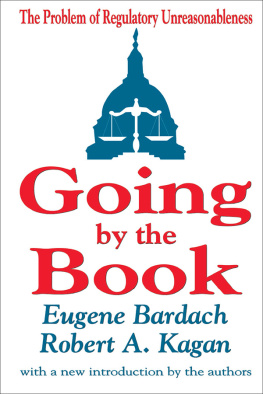Published 2002 by Transaction Publishers
Published 2017 by Routledge
2 Park Square, Milton Park, Abingdon, Oxon OX14 4RN
711 Third Avenue, New York, NY 10017, USA
Routledge is an imprint of the Taylor & Francis Group, an informa business
All rights reserved. No part of this book may be reprinted or reproduced or utilised in any form or by any electronic, mechanical, or other means, now known or hereafter invented, including photocopying and recording, or in any information storage or retrieval system, without permission in writing from the publishers.
Notice:
Product or corporate names may be trademarks or registered trademarks, and are used only for identification and explanation without intent to infringe.
Library of Congress Catalog Number: 2001053505
Library of Congress Cataloging-in-Publication Data
Bardach, Eugene.
Going by the book : the problem of regulatory unreasonableness / Eugene Bardach & Robert A. Kagan ; with a new introduction by the authors.
p. cm.
Originally published: Philadelphia : Temple University Press, 1982.
Includes bibliographical references and index.
ISBN: 0-7658-0923-0 (pbk : alk. paper)
1. Administrative law-United States. 2. Trade regulation-United States. 3. Industrial policy-United States. I. Kagan, Robert A. 11. Title.
KF5402 .B35 2002 342.7306dc21
2001053505
ISBN-13: 978-0-7658-0923-0 (pbk)
Introduction to the Transaction Edition
Toxic chemicals in municipal and industrial effluents have imperiled both the Great Lakes, on the northern border of the United States, and the Rhine River, which flows past heavily industrialized areas in Switzerland, Germany, France, and The Netherlands. The regulatory laws enacted by the United States to reduce these effluents, according to an analysis by Marco Verweij (2000), are more stringent than those of the countries that border the Rhineand they have a stronger legal punch: polluters along the Great Lakes have more often been subject to prosecutions by the U.S. Environmental Protection Agency and to lawsuits by environmental groups. Enforcement officials in France, Germany, and The Netherlands employ a more flexible, cooperation-seeking enforcement style. And yet, Verweij discovered that the West European regime has done a better job in reducing the flow of toxic chemicals into the Rhine than has the American regime for the Great Lakes.
Verweij's study reminds us that the actual effects of governmental statutes and regulations depend not merely on what they say, but on how they are implemented, particularly on the responses they elicit from the regulated community. Legalistic, adversarial regulation is necessary and effective under some circumstances, but not in others. Mismatches between regulatory methods and the problems they aim to address can be counterproductive.
Going by the Book, first published in 1982, describes the origins, nature, and consequences of such mismatches as they unfold in day-to-day interactions between regulatory officials and regulated enterprises, and discusses ways in which those mismatches can be avoided. Its empirical focus is on a variety of regulatory programs that generally are labeled "social" or "protective" regulation, that is, regimes designed to reduce such hazards and harms such as air and water pollution, workplace injuries, faulty building construction, dangerous products, employment discrimination, fires, tainted foods, poor-quality care in nursing homes, inadequate maintenance of school buses, railroad tracks, and chemical disposal sites.
Twenty years later, in the early years of the twenty-first century, the volume and scope of protective regulation are still greater. Political debates concerning the adequacy and the economic cost of regulation are just as intense. And the Verweij study, like many others, indicates that choosing precisely how to implement protective regulation is no less fateful and that the analysis in Go-ing by the Book is no less relevant.
The Problem of Regulatory Unreasonableness
Between 1977 and 1981, when working on Going by the Book, we talked with scores of regulatory enforcement officials and inspectors in a variety of American agencies, both state and federal. We also interviewed scores of officials in regulated enterprisesenvironmental engineers, corporate safety directors, manufacturing plant managers, quality control personnelwhose job it was to interact with regulatory officials and deal with the challenges of turning governmental rules into real protections under conditions of financial constraint. Our attention was drawn to the recurrence of mismatches between regulatory rules and the specific site-level technologies and conditions the rules purported to govern. In a nation committed to the rule of law, regulations are couched as general precautionary prohibitions, applicable to all enterprises equally. But in a technologically dynamic economy, conditions and risks are not all the same, and regulated enterprises vary in their capacities and degrees of cooperation. Often, as explained and illustrated in of Going by the Book, it makes sense to enforce the regulations literally. But sometimes it does not.
Confronted by arguable mismatches between legal rules and particular situations, some agencies and some regulatory agencies and officials, we learned, responded by enforcing the rules in a flexible manner. Others did not. They enforced the regulations in a mechanical, legalistic manner. Legalistic enforcement gave rise to the phenomenon suggested by the book's subtitle: the problem of regulatory unreasonableness.
Going by the Book, therefore, is about the causes and the consequences of regulatory unreasonableness. The consequences, we argued, are serious. Regulatory unreasonableness makes regulatory compliance much more inefficient and costly than it needs to be, wasting time and resources that could best be spent more constructively. Partly for that reason, and partly because it is experienced as irrational and unjust, regulatory legalism and unreasonableness are alienating. They undermine respect for government. They discourage cooperation between regulators and regulated enterprises, and that is important because cooperation is crucial for identifying and reducing the very risks that regulatory regimes are intended to address. Further, as illustrated in , regulatory legalism and unreasonableness sometimes generate a political backlash, which can reduce regulatory budgets and roll back socially desirable regulatory requirements.
Regulatory legalism and unreasonableness cannot be dismissed as an occasional aberration. A propensity toward legalism and unreasonableness is inherent in the organizational dynamics of regulatory bureaucracies and in the politics of regulation. Yet while that propensity is easily triggered, it also can be neutralized. Many regulatory agencies, in the United States as well as other countries, develop relatively non-legalistic modes of enforcement. of Going by the Book paints a portrait of "the good inspector" based on our field research in numerous regulatory programs. The good inspector exemplifies the ideal of "flexible" regulationneither uniformly legalistic nor overly accommodative, neither uniformly distrustful of regulated enterprises nor overly trustful. The good inspector is willing and able to use the coercive tools of the law when necessary, but willing and intellectually able to make sensible compromises that avoid regulatory unreasonableness and elicit cooperation.












